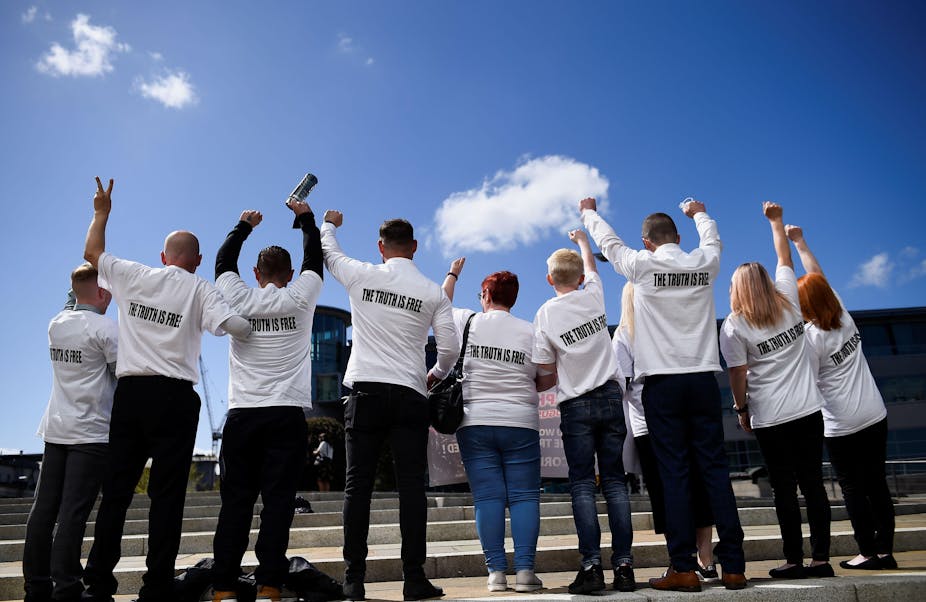The Northern Ireland assembly, in a rare show of unity, has condemned the UK government’s plans to grant an unconditional amnesty for Troubles-related crimes committed by security forces and paramilitaries in Northern Ireland.
The sweeping proposals, announced earlier this month, would see those responsible for killings, torture and serious injury being shielded from criminal investigation, civil liability, and other formal investigative processes. This would make prosecutions impossible even for the most serious crimes.
The plan has provoked strong – and remarkably unified – opposition both in Northern Ireland and the Republic. Even some military veterans and their campaigners, who would be protected by the proposals, have rejected them.
Victims and their representatives have expressed hurt and anger. Many of these families have waited decades to have their cases properly investigated. They are vowing to resist the amnesty and strongly reject the government’s claims that its plans would be in their interests.
The government’s plan marks a dramatic, unilateral departure from its previous commitments to implement the Stormont House Agreement of 2014. That agreement, reached by the main Northern Ireland political parties and the UK and Irish governments, called for a comprehensive and human rights-compliant approach to deal with legacy offences.
This approach would include police-led criminal investigations of conflict-related deaths, an information recovery process that could confidentially receive and share with families information about their relatives’ deaths, an oral history archive and measures to promote reconciliation.
The shift towards a broad amnesty is a response to independent decisions in recent years to open criminal proceedings against six soldiers in five cases related to killings during the Troubles. These are the first cases against security force personnel since the end of the conflict in 1998. Three of them have already been discontinued, but two remain and futher prosecutorial decisions are pending. The government’s decision also reflects its marked antipathy to human rights and the rule of law.
Although the new proposals retain the commitment to information recovery, they are unlikely to provide an effective alternative to robust independent investigations. International human rights law obligates the UK to conduct such investigations for torture and violations of the right to life.
Victims’ wishes
A 2018 consultation by the Northern Ireland Office found broad consensus among 17,000 respondents that the UK has “an obligation to seek to address the legacy of the past in a way that builds for the future”.
A clear majority of respondents rejected the idea of an amnesty or statute of limitations and “many were clear that victims, survivors and families are entitled to pursue criminal justice outcomes and such a move could risk progress towards reconciliation”, according to the report.
The decision to pursue impunity for security forces and paramilitaries is therefore most definitely not a response to the wishes of victims and people within Northern Ireland, including some of those representing former security forces. Why then are they seeking to impose this illegitimate – and most likely illegal under international law – measure?
The government plans use the term a “statute of limitations” rather than amnesty. This is misleading, as the amnesty would immediately and automatically end the possibility of prosecutions in cases that have not yet had a meaningful investigation.
The report argues that a statute of limitations is necessary as allowing legal proceedings to continue would lead to lengthy and expensive investigations with little chance of resulting in trials, which will inhibit truth recovery and reconciliation. These justifications for enacting amnesty are dubious, to say the least.
Legal proceedings relating to serious violations committed decades ago are of course a complex undertaking. But the government has consistently delayed and limited these processes by withholding information from investigators, litigants and their lawyers, and denying sufficient resources to prosecutors and coroners.

This government has also locked for a further 45 years – on “national security” grounds – public record files into the deaths of two children as a result of plastic bullets fired by security forces. Against this historical reality, it is very difficult to trust the government’s stated commitment to the facilitation of information recovery.
While victims and civil society groups widely accept that few criminal investigations are likely to result in sentencing, they have called for the possibility of criminal justice to remain open. They believe that investigations with full police powers are the best means of obtaining information. In addition, previous information recovery processes in Northern Ireland, such as the Disappeared Commission, have shown that concurrent criminal investigations do not prevent information being disclosed.
Learning from abroad
The government compares its proposals favourably to the South African Truth and Reconciliation Commission, which was empowered to grant amnesty in exchange for truth-telling.
But the plan’s portrayal of the South African model fails to mention that keeping the possibility of criminal prosecutions open was vitally important in pressuring perpetrators to cooperate, and imposing penalties on those who did not.
In comparing amnesties around the world, I have found that democratic governments only grant broad, unconditional amnesty for perpetrators of serious crimes where there is a very real and immediate risk of democratic collapse. For example, in post-Franco Spain where there was a looming threat that prosecutions could provoke a military coup, amnesties were used to protect peace and democracy.
In the UK, investigations and prosecutions for Troubles-related offences would not imperil democracy but could have the opposite effect. These routes to justice and accountability are an essential feature of the rule of law in the UK. The government’s proposed impunity plans would potentially subvert, rather than protect, peace and reconciliation in Northern Ireland.
Given the widespread opposition to the proposals from affected groups, the sweeping amnesty proposed by the UK government would have more in common with the widely condemned amnesties used by dictators such as Augusto Pinochet in Chile and Reynaldo Bignone in Argentina. Rather than closing the door on the past, it could open the door to further litigation, uncertainty and suffering for victims.

